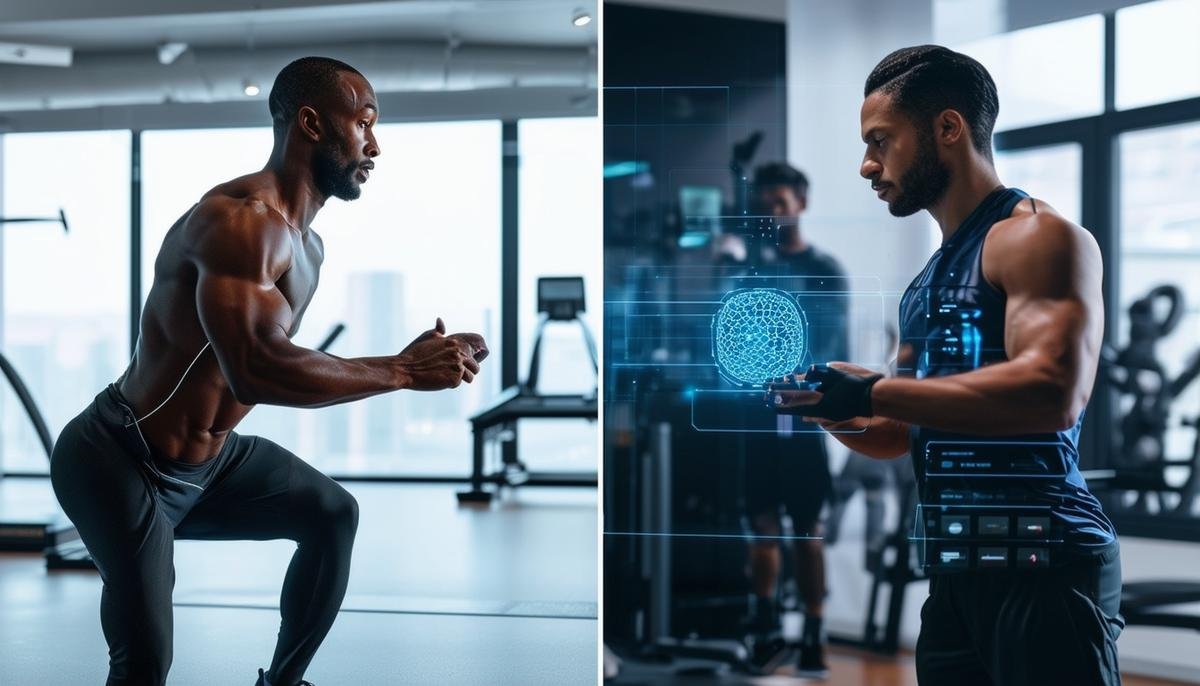Vi's Technological Advancements
Vi distinguishes itself in fitness technology with its AI capabilities. Its real-time coaching customizes workouts based on metrics like heart rate and pace. The Harman Kardon-designed headphones provide clear sound and integrate biometric sensors without encumbering the user.
Interacting with Vi is straightforward. Users can choose their preferred level of guidance and easily check stats or pause workouts with a simple tap. Vi complements human trainers with data-driven insights rather than replacing them. The incorporation of Spotify playlists adds personalization to keep users motivated.
Vi uses collected data for ongoing improvement, with low drop-off rates indicating long-term user satisfaction. Only about 28% of buyers discontinue use, according to CEO Omri Yoffe.

AI Integration in Fitness
AI integration is reshaping the fitness industry by offering personalized and efficient workouts. Tools like Vi deliver customized coaching experiences using real-time data to recommend adjustments. This technology adapts workout plans on-the-go, providing insights typically available only through expensive personal trainers.
The real-time responsiveness of AI-powered tools boosts user engagement and retention. By keeping routines fresh and challenging, these systems help reduce the monotony that often hinders ongoing exercise commitment.
As AI systems improve, they bring tools designed to meet each user's unique physiological and motivational needs. This marks a shift towards more comprehensive fitness experiences, offering everyone from novice runners to seasoned athletes a customized path to achieve their personal best.
User Experience with Vi
Vi offers an intuitive setup process and smooth integration into fitness routines. The AI coach adapts to user preferences, allowing adjustment of feedback levels. Voice commands enable easy access to stats or playlist changes without touching a phone.
During workouts, Vi's real-time feedback showcases its strengths, monitoring variables like heart rate and step count to offer insights and motivational pushes. The system learns from each session, making future workouts more attuned to evolving fitness levels and preferences.
The Harman Kardon headphones enhance immersion with premium sound quality. This combination of personalized coaching and audio creates a holistic exercise environment that engages and supports users throughout their fitness journey.
Comparing AI Coaches to Human Trainers
AI coaches like Vi excel in providing instant, data-driven personalization and efficient analysis of biometric data. They offer precise guidance based on continuously collected metrics. However, human trainers bring nuanced understanding and intuition that machines currently can't replicate.
- Human trainers can sense when an athlete is tired and adjust accordingly, offering personal insights to boost morale.
- They can build relationships that inspire beyond the numbers, integrating empathy and genuine encouragement.
- While AI systems demonstrate adaptability by quickly adjusting to changes in training data, they lack the historical context of an athlete's journey.
- Human trainers can use their knowledge and experiences with individuals over extended periods to optimize training strategies.
The best approach often combines AI and human trainers. The computational efficiency and real-time data analysis of AI paired with the emotional intelligence and personalized motivation of human trainers create a powerful combination for personalized fitness coaching.

Future of AI in Fitness
As AI progresses, fitness technology is set to transform how we approach health and exercise. Future AI systems could anticipate changes in physical performance by analyzing broader health data, turning exercise regimens into comprehensive health plans.
Improvements in real-time biometric feedback could lead to more sophisticated instant analysis, potentially using bio-sensors in wearables to provide precise workout adjustments. AI could become more skilled at learning personal preferences and psychological states, modifying motivational strategies and communication styles accordingly.
Challenges include addressing ethical concerns about data privacy and security, as well as ensuring AI tools remain accessible to a wide range of users. The future likely involves AI and human trainers working together synergistically, with AI handling precise data analysis and continuous monitoring, allowing human trainers to focus on mentorship and deeper personal interaction.

As technology advances, the combination of AI and fitness continues to reshape personal training. While AI tools like Vi offer precise data-driven insights, they supplement rather than replace the human element in coaching. This partnership promises a future where both technology and human intuition collaborate to support individual fitness journeys.
- Asteroth A, et al. The advance of digital training concepts. Federal Institute for Sports Science. 2021.
- Yoffe O. Vi: The first ever artificial intelligence training device. LifeBEAM. 2017.
- Rossi A, et al. Predicting injuries in professional soccer using AI. University of Pisa. 2021.
- Federal Institute of Sports Science. Artificial intelligence for elite sport in the field of tension between big and small data. 2021.


